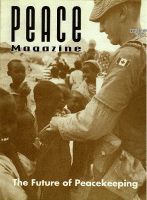
Peace Magazine Nov-Dec 1993, page 5. Some rights reserved.
Search for other articles by various here
We were happy to see your article about Captain Yolanda Huet-Vaughn and her courageous resistance to Operation Desert Storm in the Persian Gulf.
We were disappointed however with your failure to make any mention of groups like ours which have spent hundreds of hours and thousands of dollars in support of Yolanda's acts of resistance. As you know, movements-not individuals-are what can bring about real change in governmental policy.
We also felt your article gave readers a distorted idea of just how Yolanda was able to score the victories that she has. For example, Amnesty International by adopting her as a Prisoner of Conscience, stimulated tile writing of thousands of letters from around the world. This flood had the direct result of getting the commanding general at Ft. Leonard Wood to cut her sentence from 30 to 15 months. They also helped influence the decision of Secretary of the Army to cut her sentence further to eight months.
Our lawyer, Louis Font, has spent hundreds of hours preparing and then arguing her appeal to the Army Court of Military Review. He'll be by her side if we have to go to the next highest court-the Court of Military Appeals.
In Kansas, many individuals have worked on Yolanda's fight to keep her licence. Her lawyer there, Donald Strole, has also put in hundreds of hours, with virtually no compensation.
We must build movements with these struggles -not just perpetuate the power elite's idea that lonely individuals can make a difference (if only "justice" is on their side!).
In the spirit of solidarity, Tod Ensign, Director, Citizen Soldier
I visited Batticaloa, a provincial town where there has been great suffering. Soldiers of the Sri Lankan Forces seize young men, who are not seen again. A religious leader told me, "We assume they have been killed."
He is one of a handful of people courageous enough to work on the Batticaloa Peace Committee. It collects information on disappeared people. This information helps the widows obtain a death certificate, which is necessary to receive any economic aid available through government agencies. Over the past three years the Peace Committee has recorded more than 4,000 disappearances. During that time two of its chairmen have resigned due to threats on their lives. h is astounding that the Peace Committee has not only survived, hut has become a tolerated intermediary.
between the armed forces and the local people. They have negotiated the right to have all detainees released through the Peace Committee. The Peace Committee cannot broadly publish its facts on disappearances in order to avoid censure, being labeled as subversive, or being condemned as serving political interests. It is run completely on a voluntary basis, and members purchase their supplies out of their own pockets.
One reason we hear so little about the situation in Sri Lanka is that information is tightly controlled here. The murder of a well-known Sri Lankan journalist a few years back still serves as a reminder to media workers. His death remains an a unsolved crime." Eye witnesses identified a senior superintendent of police as part of the abduction team that kidnapped him.
Although there are 150 periodicals on the island, critical papers can find themselves unable to print for lack of paper. Newsprint can only be imported under license, along with explosives and firearms! Papers producing critical articles have found their offices sealed by tax assessors. To combat attacks on free expression, journalists and media professionals recently formed the Free Media Movement (FMM). They have been careful not to ally with any Sri Lankan political party to avoid being labelled a political tool. The FMM seeks to inform the public about threats to democratic process contained in the increasing restrictions on free expression, stop attacks on media personnel, and curb the blatant abuse of public mass media by the government for its own political purposes. Since the middle of 1992, when the FMM formed, they have held rallies and demonstrations in various parts of the island to protest proposed restrictions or bans by local government officials on critical publications, sometimes directly challenging the ban by selling or distributing the banned publication on the street.
Normality, for the people of Batticaloa, now means accepting having one's bag checked by a soldier at a check point every time one goes to the market.
The cleric in Batticaloa told me before we parted, "When I started work here 40 years ago, it was paradise. There were no murders. Now we have lost our innocence and can never go back to what we were.
It is the courage of people like the Peace Committee and FMM who will restore dignity to this island.
Yeshua Moser, Peace Brigades International Volunteer Team of Human Rights Observers

Peace Magazine Nov-Dec 1993, page 5. Some rights reserved.
Search for other articles by various here